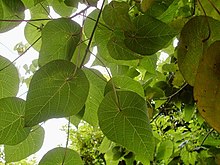Macaranga tanarius: Difference between revisions
m fix authority formatting |
m common names in bold, not italics; rm overlinking |
||
| Line 18: | Line 18: | ||
'''''Macaranga tanarius''''' is a plant found in [[South East Asia]], [[Papua New Guinea]] and eastern [[Australia]]. It's commonly seen as a pioneer species in disturbed [[rainforest]] areas. Easily recognised for the round veiny leaves. In Australia it naturally occurs from the [[Richmond River, New South Wales]] to [[Cooktown]] in tropical [[Queensland]]. |
'''''Macaranga tanarius''''' is a plant found in [[South East Asia]], [[Papua New Guinea]] and eastern [[Australia]]. It's commonly seen as a pioneer species in disturbed [[rainforest]] areas. Easily recognised for the round veiny leaves. In Australia it naturally occurs from the [[Richmond River, New South Wales]] to [[Cooktown]] in tropical [[Queensland]]. |
||
Some of the many common names include ''Blush Macaranga'', ''Nasturtium Tree'', ''David's Heart'' and ''Heart Leaf''. |
Some of the many common names include '''Blush Macaranga''', '''Nasturtium Tree''', '''David's Heart''' and '''Heart Leaf'''. |
||
== Description == |
== Description == |
||
| Line 26: | Line 26: | ||
Leaves alternative, round with a tip. 8 to 23 cm long, greyish or white on the underside. Prominent leaf stalks ''8 to 20 cm'' long which connect ''within the leaf itself''. Nine main veins radiate from the leaf stalk, easily noticed on the upper and lower leaf side. |
Leaves alternative, round with a tip. 8 to 23 cm long, greyish or white on the underside. Prominent leaf stalks ''8 to 20 cm'' long which connect ''within the leaf itself''. Nine main veins radiate from the leaf stalk, easily noticed on the upper and lower leaf side. |
||
Yellow/green flowers form on [[panicle]]s in the months of October to January (in [[New South Wales]]). Female and male flowers on different trees. The fruit is a prickly three celled yellow capsule, 9 mm in diameter, maturing in January to February (in |
Yellow/green flowers form on [[panicle]]s in the months of October to January (in [[New South Wales]]). Female and male flowers on different trees. The fruit is a prickly three celled yellow capsule, 9 mm in diameter, maturing in January to February (in New South Wales). One black seed in each of the cells. Germination from fresh seed occurs without difficulty. Cuttings strike well. |
||
== Uses == |
== Uses == |
||
Revision as of 11:43, 18 July 2009
| Macaranga tanarius | |
|---|---|

| |
| Macaranga tanarius - leaves | |
| Scientific classification | |
| Kingdom: | |
| Division: | |
| Class: | |
| Order: | |
| Family: | |
| Genus: | |
| Species: | M. tanarius
|
| Binomial name | |
| Macaranga tanarius | |
| Synonyms | |
| |
Macaranga tanarius is a plant found in South East Asia, Papua New Guinea and eastern Australia. It's commonly seen as a pioneer species in disturbed rainforest areas. Easily recognised for the round veiny leaves. In Australia it naturally occurs from the Richmond River, New South Wales to Cooktown in tropical Queensland.
Some of the many common names include Blush Macaranga, Nasturtium Tree, David's Heart and Heart Leaf.
Description
A shrub or bushy tree, sometimes reaching 12 metres tall and a stem diameter of 40 cm. The trunk is short and crooked. Bark being grey brown, with bumps and irregularities. The branchlets are smooth, bluish grey with prominent leaf scars.
Leaves alternative, round with a tip. 8 to 23 cm long, greyish or white on the underside. Prominent leaf stalks 8 to 20 cm long which connect within the leaf itself. Nine main veins radiate from the leaf stalk, easily noticed on the upper and lower leaf side.
Yellow/green flowers form on panicles in the months of October to January (in New South Wales). Female and male flowers on different trees. The fruit is a prickly three celled yellow capsule, 9 mm in diameter, maturing in January to February (in New South Wales). One black seed in each of the cells. Germination from fresh seed occurs without difficulty. Cuttings strike well.
Uses
An attractive ornamental tree with interesting leaves. Also well regarded by bush regenerators to provide shade for juvenile trees.

References
- PlantNET - The Plant Information Network System of Botanic Gardens Trust, Sydney, Australia - July 19th, 2009.
http://plantnet.rbgsyd.nsw.gov.au/cgi-bin/NSWfl.pl?page=nswfl&lvl=sp&name=Macaranga~tanarius
- Floyd, A.G., Rainforest Trees of Mainland South-eastern Australia, Inkata Press 1989, ISBN 0-909605-57-2 page 149
